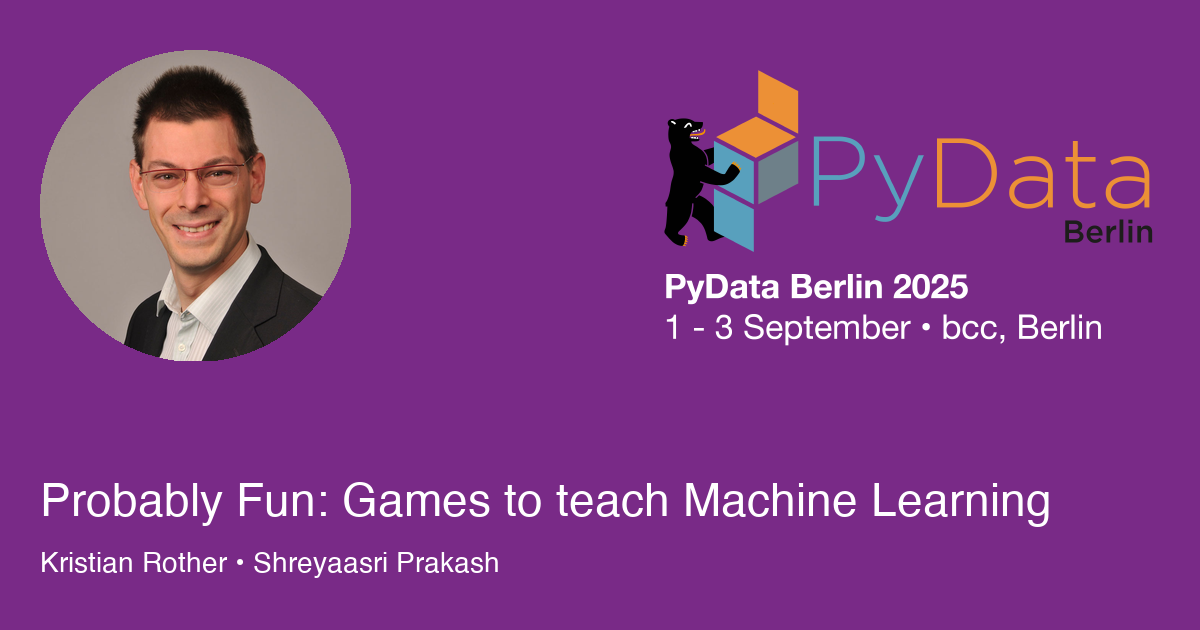PyData Berlin
Probably Fun: Games to teach Machine Learning
Tutorial

Abstract
In this tutorial, you will play several games that can be used to teach machine learning concepts. Each game can be played in big and small groups. Some involve hands- on material such as cards, some others involve electronic app. All games contain one or more concepts from Machine Learning. As an outcome, you will take away multiple ideas that make complex topics more understandable – and enjoyable. By doing so, we would like to demonstrate that Machine Learning does not require computers, but the core ideas can be exemplified in a clear and memorable way without. We also would like to demonstrate that gamification is not limited to online quiz questions, but offers ways for learners to bond. We will bring a set of carefully selected games that have been proven in a big classroom setting and contain useful abstractions of linear models, decision trees, LLMs and several other Machine Learning concepts. We also believe that it is probably fun to participate in this tutorial.
Prerequisites
interest in actively participating in the games.
Description
Board gaming has recently been declared part of the immaterial cultural heritage in Germany by UNESCO. Games encourage people to use their brains in a focused, constructive and peaceful way. This makes games a fantastic tool in the classroom. While many games contain algorithms and statistical models right under the surface, finding an actual model of Machine Learning is a bit harder. We have put some thought into creating or finding games that have a clear connection to Machine Learning.
We have conducted a tutorial featuring board games at PyConDE 2025. This time, we have increased the ante and moved the focus from statistics to Machine Learning. Also, at PyData Berlin we expect a particular challenge: we do not expect a room with tables for 80+ people. Therefore, we chose game mechanics that work with minimal material and scale up to big groups. As a consequence, the games would be easier to adapt to a larger class, such as university courses and seminars. Also, we take care to limit the time a game requires. In a classroom situation this allows to use the game as a priming exercise that can be followed up with theory and/or practical exercises using computers and programming.
The tutorial will be executed according to the following pseudocode (or lesson plan):
- Game #1 is played in a plenary (5 min)
- The presenters give a short introduction on why games matter (5 min)
- The audience is randomly sampled into teams of 6 (2 min)
- Game #2 is played in the teams in a cooperative manner (15 min)
- Game #3 is played in the teams in a cooperative manner (15 min)
- Game #4 is played with the teams competing against each other (20 min)
- Winners are determined and applauded (5 min)
- Game #5 is played in the plenary again (10 min)
- Q & A and wrap-up (10 min)
One of the presenters is certified as a board game educator "Fachkraft für Gesellschaftsspiele" by the Brettspielakademie (https://brettspielakademie.de/).
The games and lessons have been field-tested with university courses and are made available under a Creative Commons license. You are free to reuse or modify them for your own teaching. Several games (mostly on statistics) and sample lesson plans are available on https://www.academis.eu/probably_fun/ .
Speakers

Kristian Rother
freelance
Kristian is a freelance Python trainer who wrote his first lines of Python in the year 11111001111. After a career writing software for life science research, he has been teaching Python, Data Analysis and Machine Learning throughout Europe since 2011. More recently, he has built data pipelines for the real estate and medical sector. Kristian has translated 5 Python books and written 2 more himself, in addition to numerous teaching guides. Kristian has collected 364 stars on Advent of Code. His knowledge about async is, unfortunately, miserable. His favorite Python module is 're'. Kristian believes everybody can learn programming.